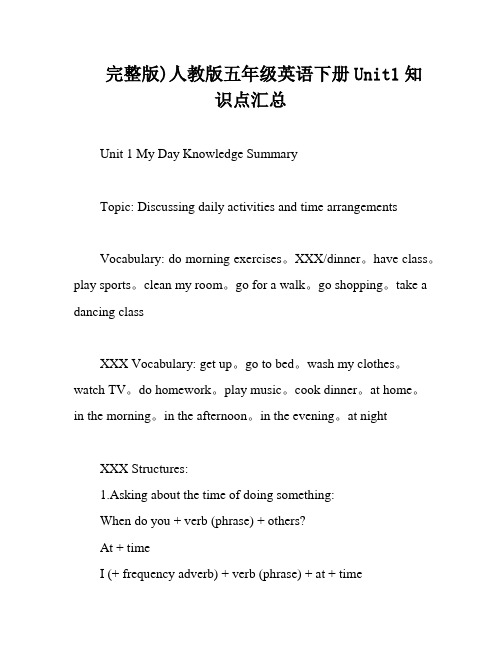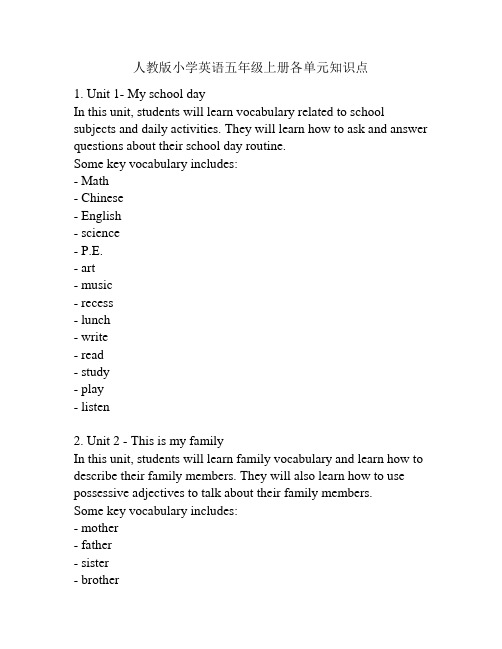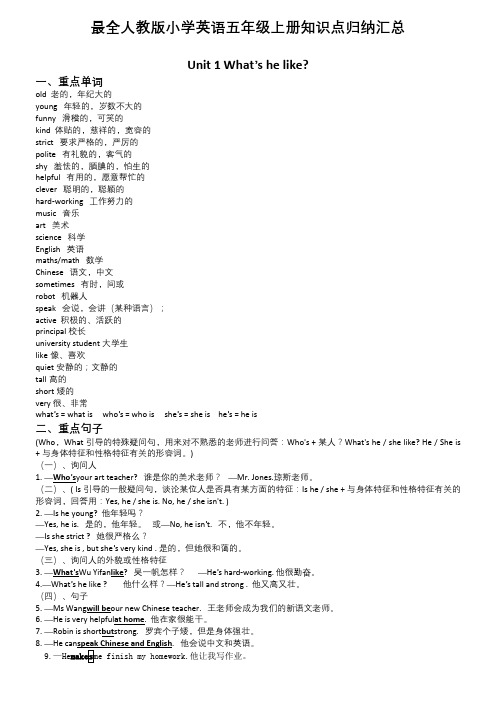人教版五年级英语上册各单元以及下册unit1知识点详细归纳(附带练习题)
人教版小学五年级英语上册第一二三单元知识点

人教版小学五年级英语上册第一二三单元知识点新人教版小学五年级上册第一单元知识点Unit1What’shelike?一.单词1.形容人的形容词新词:young年轻的old年老的kind和蔼的strict严格的funny滑稽可笑的cle*er聪明的polite有礼貌的helpful乐于助人的shy害羞的hard-working努力工作(学习)的复习:tall高的short矮的strong强壮的fat胖的thin瘦的smart 聪明的acti*e积极的、活跃的quiet安静的、文静的nice好的lo*ely可爱的2.称呼用词:Mr先生Miss女士(未婚)Ms女士(不明是否已婚)Mrs夫人(随丈夫姓)3.频率词:often经常usually通常sometimes有时4.任课教师anartteacher一位美术老师anEnglishteacher一位英语老师amathsteacher一位数学老师ascienceteacher一位科学老师aChineseteacher一位语文老师amusicteacher一位音乐老师aPEteacher一位体育老师二.句型1.Who’syour()teacher?谁是你的()老师?Mr…...某先生。
Miss…...某女士(未婚)。
Ms……..某女士(不明是否已婚)。
Mrs…….某夫人(随丈夫姓)。
括号里填科目2.问:What’s()like?某人怎么样?括号里可填:(she/he/yourfather/yourartteacher/ZhangPeng/MrLi)答He/Sheis().括号里填描述人的形容词3.MissWangwillbeournewEnglishteacher.王女士将会是我们的新英语老师。
4.Isshe/hekind?她是和蔼的吗?肯定回答Yes,she/heis.否定回答No,she/heisn’t.5.DoyouknowMrYoung?你知道杨先生吗?肯定回答:Yes,Ido.否定回答:No,Idon’t.三.句型变换1.Sheiskind.(变为疑问句)Isshekind?2.Mikeisyoung.(对划线部分提问)What’sMikelike?3.Iknow.(变为否定句)Ido n’tknow.四.be动词的用法五.字母y在单词结尾发音[I] happybabysunnywindysorrymanycandypartyfamily新人教版小学五年级上册第二单元知识点Unit 2 My week一.单词classschedule课程表weekendMondayTuesday WednesdayThursdayFridaySaturdaySundayChinese English Chinese maths ChineseChinese English ChineseChinesemathsmathsmathsChinesemathsmaths moraleducation science Englishafternoon Chinese Chinese PE science PE English Chinese mathsmoraleducation musicart学校课程mathsChinesemathsmathsmaths二.1.星期:Monday星期一Tuesday星期二Wednesday星期三Thursday 星期四Friday星期五Saturday星期六Sunday星期天week一周weekend周末weekday工作日day天2.科目:语文Chinese数学maths英语English品德与社会moraleducation科学science音乐music美术art计算机课computerclass体育课PE烹饪课cookingclass3.schedule时刻表classschedule课程表4.短语:dohomework做作业watchTV看电视readbooks读书washmyclothes洗我的衣服playfootball踢足球playping-pang打篮球playbasketball打篮球playsports做运动playthepipa弹琵琶drawpictures画画learntheroom打扫房间dohousework做家务listentomusic听音乐二.句型1.Whatdayisittoday?今天星期几?It’sTuesday.星期二。
完整版)人教版五年级英语下册Unit1知识点汇总

完整版)人教版五年级英语下册Unit1知识点汇总Unit 1 My Day Knowledge SummaryTopic: Discussing daily activities and time arrangementsVocabulary: do morning exercises。
XXX/dinner。
have class。
play sports。
clean my room。
go for a walk。
go shopping。
take a dancing classXXX Vocabulary: get up。
go to bed。
wash my clothes。
watch TV。
do homework。
play music。
cook dinner。
at home。
in the morning。
in the afternoon。
in the evening。
at nightXXX Structures:1.Asking about the time of doing something:When do you + verb (phrase) + others?At + timeI (+ frequency adverb) + verb (phrase) + at + timeXXX: When do you get up in the morning?At 7:30.I often get up at 7:30.2.Asking about XXX activities:What do you often do on the weekend?I often (always/sometimes/usually) + (weekend activity) + with (someone) + on the XXX).XXX: What do you do on the weekend?I often XXX.Key Points:1.Pay n to n usage:at + specific time (hour)/night/homein + country/seasonon + day of the week/weekend2.Differences een time frequency adverbs:Always: always。
人教版小学英语五年级上册各单元知识点

人教版小学英语五年级上册各单元知识点1. Unit 1- My school dayIn this unit, students will learn vocabulary related to school subjects and daily activities. They will learn how to ask and answer questions about their school day routine.Some key vocabulary includes:- Math- Chinese- English- science- P.E.- art- music- recess- lunch- write- read- study- play- listen2. Unit 2 - This is my familyIn this unit, students will learn family vocabulary and learn how to describe their family members. They will also learn how to use possessive adjectives to talk about their family members.Some key vocabulary includes:- mother- father- sister- brother- grandmother- grandfather- aunt- uncle- cousin- daughter- son- possessive adjectives (my, your, his, her)3. Unit 3 - At the zooIn this unit, students will learn vocabulary related to animals and their habitats. They will also learn how to talk about what animals can do (i.e. run, swim, fly, etc.).Some key vocabulary includes:- lion- tiger- elephant- giraffe- monkey- panda- kangaroo- penguin- habitat (forest, desert, ocean, etc.)- can/can't4. Unit 4 - My homeIn this unit, students will learn vocabulary related to the rooms in a house and furniture. They will also learn how to use prepositions to describe where things are in a room.Some key vocabulary includes:- living room- kitchen- bedroom- bathroom- dining room- sofa- table- chair- bed- closet- prepositions (on, under, next to)5. Unit 5 - My scheduleIn this unit, students will learn how to talk about their daily schedules and activities. They will also learn vocabulary related to time and daily routines.Some key vocabulary includes:- wake up- brush teeth- take a shower- go to school- come home- eat dinner- do homework- bed time- time (hour, minute, second)6. Unit 6 - My hobbiesIn this unit, students will learn how to talk about their hobbies and interests. They will also learn vocabulary related to differenthobbies and sports.Some key vocabulary includes:- play soccer- dance- sing- draw- swim- ride a bike- play the piano- watch TV- read books- hobby- interest7. Unit 7 - Our worldIn this unit, students will learn vocabulary related to different countries and cultures. They will also learn how to ask and answer questions about different places in the world.Some key vocabulary includes:- country- flag- language- symbol- landmark- continent- questions (What's the capital of...? What language do they speak in...?)8. Unit 8 - Let's celebrate!In this unit, students will learn vocabulary related to holidays andcelebrations. They will also learn about different traditions and customs around the world.Some key vocabulary includes:- Halloween- Thanksgiving- Christmas- New Year's Day- Valentine's Day- Easter- tradition- custom- celebrateOverall, these units will help students develop their language skills in various areas such as vocabulary acquisition, grammar usage, and communication. By the end of the fifth grade, students will have a foundation of English language that will prepare them for more complex language use in the future.In addition to the vocabulary and grammar covered in these eight units, there are also important language skills that students will develop, such as reading comprehension and writing ability. Throughout the units, students will be completing various reading activities to help them understand and contextualize the new vocabulary and grammar they are learning. They will also be practicing writing skills, such as paragraph writing and short answer responses.Reading comprehension is a vital skill for English language learners, as it helps students to understand and interpret new information. In each unit, there will be reading passages related to that unit's topic. For example, in Unit 3, students may read aboutdifferent animal habitats and learn how animals adapt to their environment. Reading comprehension activities may include reading comprehension questions, matching exercises, and writing exercises. By the end of each unit, students should have a solid understanding of the reading material and be able to answer questions related to the content.Writing is another essential skill that students will develop throughout these units. Writing exercises will be incorporated into each unit, helping students to practice writing in English and apply the new vocabulary and grammar they are learning. Some writing exercises may include writing short paragraphs about their hobbies or describing their family members. By the end of the fifth grade, students should be able to write coherent paragraphs with proper grammar, spelling, and punctuation.Speaking and listening skills will also be developed through group and partner activities in each unit. Students will be encouraged to ask and answer questions in English, and engage in conversations with their peers. They will also have opportunities to give short presentations on topics related to each unit, which will help them develop their public speaking skills.Overall, these eight units are designed to provide a comprehensive language learning experience for students in fifth grade. By the end of the program, students should be able to understand and use everyday English vocabulary and grammar in a variety of contexts. They should also be able to read and comprehend short passages, write short paragraphs independently, and engage in conversations and presentations with their peers. It is important to note thatlanguage learning is a gradual process, and students will vary in their language proficiency at the end of the program. However, with consistent practice and dedication, students in fifth grade will be well-prepared for more advanced language learning in the future.。
人教版小学英语五年级上册各单元知识点

人教版小学英语五年级上册各单元知识点Unit 1: Nice to Meet You•熟悉问候语和自我介绍用语。
•学习用“Hello,I am…”自我介绍。
•学习问候语及其回答。
Unit 2: At School•学习在校用语,如上课和下课用语。
•学习宿舍,教室和食堂等校园建筑的英文表达。
•学习星期、月份等时间词汇。
Unit 3: My Family•学习家庭成员的称呼,如父母、兄弟姐妹等。
•学习描述家庭成员的外貌特征和性格特征。
•学习询问和回答某人的家庭情况的问句和答句。
Unit 4: Where Are You From?•学习国家、城市和语言等与地理相关的词汇。
•熟悉和使用描述人所来自的地方的表达方式。
•学习询问和回答某人的来自何处的问句和答句。
Unit 5: Colours•学习基本颜色词汇,如红色、绿色等。
•学习描述物品颜色的常用表达方式。
•练习用形容词来描述颜色的特征和连词的使用。
Unit 6: My Classroom•学习描述教室内物品和教具用语。
•学习询问和回答物品位置的问句和答句。
•学习表达喜欢和不喜欢的情感表达。
Unit 7: My Favourite Food•学习常见食物的名称和特征,如汉堡、薯条等。
•学习用形容词来描述食物的味道和口感。
•学习表达喜欢和不喜欢的情感表达。
Unit 8: My Free Time•学习描述活动,如听音乐、看电影等。
•学习时间的表现方式和时间状语的使用。
•练习运用常用动词的现在进行时来表达正在进行的活动。
Unit 9: At the Park•学习描述公园内的物品和设施的用语。
•学习询问和回答某人是否喜欢某个活动的问句和答句。
•练习运用一般现在时来表达习惯性、经常性的活动。
Unit 10: Can I Help You?•学习购物所用的基本表达方式和句型,在购物场景中运用语言交流。
•学习询问和回答商品种类、价格、运费等相关问题的问句和答句。
人教精通版五年级英语上册各单元知识点汇总

人教精通版五年级英语上册各单元知识点汇总Unit 1 We have new friends.单元知识必备清单重点词汇hello 喂;嗨(招呼用语)am 是I’m=I amwhere 哪里are 是you 你;你们from 从what 什么is 是your 你的;你们的name 名字what’s=what is Britain 英国Australia 澳大利亚New Zealand 新西兰France 法国Germany 德国Russia 俄罗斯city 城市road 道路street 街道重点短语come here 到这里来come from 来自welcome to... 欢迎来到……重点句型1. I’m Bob. I’m eleven. 我是鲍勃。
我11 岁。
解读:在向别人进行自我介绍时,常用“I’m...”句型表示“我是……”。
该句型主要用于介绍自己的名字、年龄、身材等。
2. —Where are you from? 你来自哪里?—I’m from France. 我来自法国。
解读:问句是由where 引导的特殊疑问句,用来询问某人来自哪里。
句型结构:—Where + be 动词+ 主语+ from? —主语+ be动词+ from + 地点名词。
同义句:—Where do you come from? 你来自哪里?—I come from Germany. 我来自德国。
本句也是询问某人来自哪里,句中有实义动词come, 因此必须借助助动词do 的相应形式来构成问句。
3.—What’s your name?你的名字是什么?—My name is Cathy.我的名字是凯茜。
解读:本句用来询问对方的姓名。
what’s 是what is 的缩写形式。
my 和your 是形容词性物主代词。
句型结构::—What’s your name? —My name is + 名字/ I’m + 名字.4. —Where do you live, Cathy?你住在哪里,凯茜?—I live in the Happy City. 我住在幸福城。
人教版五年级英语上册各单元以及下册unit1知识点详细归纳(附带练习题)

人教版五年级英语上册各单元以及下册unit1知识点详细归纳(附带练习题)Unit 1 What’s he like ?一、单元词汇old年老的young年轻的funny滑稽的kind和蔼的strict严格的polite有礼貌的hard-working工作努力的helpful愿意帮助的shy害羞的clever聪明的know知道our我们的will将要ometimes有时候二、单元知识点一般疑问句的改法:①类句子:含有be动词作谓语的句子、或者含有情态动词(will、can、should等)的英语句子,改为疑问句时,把be动词/情态动词提到句首即可!例如:He is very helpful →Is he very helpful?They are hard-working →Are they hard-working?Mike can do kung fu →Can Mike do kung fu?②类句子:含有实义动词作谓语的句子,改为疑问句时,在句首加do/does,主语是第三人称单数时加does,并且谓语动词要去掉三单形式变回原形!例如:I know Mary →Do you know Mary?They play football on the playground?→Do they play football on the playground?三单形式:当主语是第三人称单数时,后面的实义动词谓语必须是三单形式(一般在实义动词后加s)例如:I read books →He reads booksYou play the piano →He plays the piano三单形式的句子改为一般疑问句:Does he read books?Does he play the piano?另外要注意:第一人称和第二人称要互相转换!练习:将下列句子改为一般疑问句:1、I am very helpfull at home __________________________________2、She will come to my birthday party___________________________3、I know__________________________________________________4、He knows________________________________________________1、Do you know Mr Young?这是一个疑问句,陈述句原来是I know Mr Young,②类句子肯定回答:Yes,I do否定回答:No,I don’t2、形容词性物主代词= 形容词,修饰名词我的笔I pen(×)my pen(√)你的尺子you ruler (×)your ruler(√)_____ pen 我的钢笔______parents她的父母_______house他们的房子3、Is your English teacher strict?原来的陈述句:My English teacher is strict,①类句子,所以改为疑问句只须把be动词提到句首即可,my变为yourBe 动词+ 人+ 描述体貌特征或性格特点的形容词?意为“某人是......的吗?”肯定回答:Yes,人+ be动词否定回答:No,人+ be动词not例如:——Is your P.E. teacher funny?——Yes,he is——Are your parents strict?——No,they aren’t你的体育老师高吗?是的,她很高_______________________________________你的数学老师年轻吗?不,她不年轻_______________________________________4、如何询问别人某一学科的老师是谁?可以借用特殊疑问词who(谁)的帮助,Who ’s your + 学科+ teacher?意为“你的......老师是谁?”回答:Mr/Mrs/Miss +姓氏例如:——Who is your English teacher?——Miss Green——Who is your math teacher?——Mr Ma5、what is he like?在这句话中,like不是“喜欢”的意思,而是“像......一样”的意思,因为like 有两种词性:①动词,意为“喜欢”,实义动词谓语,不能和be动词同时出现;I like hamburger;I like apples and grapes②介词,意为“像......一样”,可以跟在be动词后面作表语;Their child is like himHis words are like wisdom询问别人的体貌特征或性格特点的句型:What ’s + 某人+ like?,意为询问“某人是像......样的/某人怎么样?”回答:He’s/She’s + 描述体貌特征或性格特点的形容词.例如:——What is she like?——She is tall and thin——What is your art teacher like?——He is young and funny6、频率副词sometimes(有时候),usually(通常),often (经常),通常放在主语和动作之间I sometimes read books in the morningI often play football on the playgroundI usually do my homework at 8 o’clock7、must是情态动词,情态动词后面跟谓语动词原形(两类谓语)He is tall and strongHe must be tall and strongShe is our new English teacherShe will be our new English teacher8、let me help youLet sb do sth,sb = somebody(某人),sth = something (某事),意为“让某人做某事”,sb如果是人称代词,那必须得是宾格形式的Let’s go to school = let us go to schoolLet Mike help youLet him come inUnit 1 单元习题一、选出不同类的单词,并将其序号填到题前的括号内。
最新最全人教版小学英语五年级上册知识点归纳汇总

最全人教版小学英语五年级上册知识点归纳汇总Unit 1 What’s he like?一、重点单词old 老的,年纪大的young 年轻的,岁数不大的funny 滑稽的,可笑的kind 体贴的,慈祥的,宽容的strict 要求严格的,严厉的polite 有礼貌的,客气的shy 羞怯的,腼腆的,怕生的helpful 有用的,愿意帮忙的clever 聪明的,聪颖的hard-working 工作努力的music 音乐art 美术science 科学English 英语maths/math 数学Chinese 语文,中文sometimes 有时,间或robot 机器人speak 会说,会讲(某种语言);active 积极的、活跃的principal 校长university student大学生like像、喜欢quiet安静的;文静的tall高的short矮的very 很、非常what’s = what is who’s = who is she’s = she is he’s = he is二、重点句子(Who,What引导的特殊疑问句,用来对不熟悉的老师进行问答:Who's + 某人?What's he / she like? He / She is + 与身体特征和性格特征有关的形容词。
)(一)、询问人1. —Who’s your art teacher? 谁是你的美术老师?—Mr. Jones.琼斯老师。
(二)、( Is引导的一般疑问句,谈论某位人是否具有某方面的特征:Is he / she + 与身体特征和性格特征有关的形容词,回答用:Yes, he / she is. No, he / she isn't. )2. —Is he young? 他年轻吗?—Yes, he is. 是的,他年轻。
或—No, he isn’t. 不,他不年轻。
—Is she strict ? 她很严格么?—Yes, she is , but she’s very kind . 是的,但她很和蔼的。
PEP人教版五年级上英语Unit1知识点、考点梳理精编

PEP人教版五年级上英语Unit1知识点、考点梳理精编知识点梳理:1. 单词:表示家庭成员的名词,如father(父亲)、mother(母亲)、brother(兄弟)、sister(姐妹)、grandfather(外祖父)、grandmother(外祖母)、uncle(叔叔)、aunt(阿姨)等。
2. 句型:询问家庭成员的句型,如Who's this/that?(这/那个是谁?),It's my father/mother/brother/sister/grandfather/grandmother/uncle/aunt.(这是我爸爸/妈妈/哥哥/姐姐/外公/外婆/叔叔/阿姨。
)3. 短语:表示家庭关系的短语,如爸爸的妈妈(father's mother)、妈妈的爸爸(mother's father)等。
4. 介词:表示所属关系的介词,如of(的),用于连接家庭成员与其所属关系的词语,如father of(...的父亲)、mother of(...的母亲)等。
考点梳理:1. 听力:辨别家庭成员的听力题,根据听到的描述或问句选择正确的家庭成员名称。
2. 口语:回答关于家庭成员的问题,根据问题回答正确的家庭成员名称。
3. 语法:掌握询问家庭成员的句型,以及回答这个句型的正确用法。
4. 理解:理解描述家庭关系的短语,能够根据短语理解家庭成员之间的关系。
5. 书写:正确拼写家庭成员的单词,注意大小写和单复数的变化。
6. 翻译:能够翻译一些关于家庭成员的句子,包括询问和回答家庭成员的句型,以及描述家庭关系的短语。
注:以上内容为人工智能根据题目和知识点推断出的可能答案,仅供参考。
- 1、下载文档前请自行甄别文档内容的完整性,平台不提供额外的编辑、内容补充、找答案等附加服务。
- 2、"仅部分预览"的文档,不可在线预览部分如存在完整性等问题,可反馈申请退款(可完整预览的文档不适用该条件!)。
- 3、如文档侵犯您的权益,请联系客服反馈,我们会尽快为您处理(人工客服工作时间:9:00-18:30)。
Un it 1 What 'she like 、单元词汇old年老的polite 有礼貌的clever 聪明的you ng年轻的funny滑稽的kind和蔼的strict严格的hard-working工作努力的helpful愿意帮助的shy害羞的二、单元知识点一般疑问句的改法:①类句子:含有be动词作谓语的句子、或者含有情态动词(will、can、should等)的英语句子,改为疑问句时,把be动词/情态动词提到句首即可!例如:He is very helpful Is he very helpful ?They are hard-working Are they hard-working ?Mike can do kung fu Can Mike do kung fu ?②类句子:含有实义动词作谓语的句子,改为疑问句时,在句首加do/does,主语是第三人称单数时加does,并且谓语动词要去掉三单形式变回原形!例如:I know Mary 宀Do you know Mary ?They play football on the playground ? Do they play football on the playground ?三单形式:当主语是第三人称单数时,后面的实义动词谓语必须是三单形式(一般在实义动词后加s)例如:I read books 宀He reads booksYou play the piano He plays the piano三单形式的句子改为一般疑问句:Does he read books?Does he play the piano ?另外要注意:第一人称和第二人称要互相转换!练习:将下列句子改为一般疑问句:1、I am very helpfull at home _________________________________2、She will come to my birthday party __________________________3、I know ________________________________________________4、He knows _____________________________________________1、Do you know Mr You ng ?这是一个疑问句,陈述句原来是肯定回答:Yes, I do否定回答:No, I don '我的笔I pen (x) my pen (V)I know Mr You ng,②类句子你的尺子you ruler (x) your ruler (V)____ pen 我的钢笔__________ parents 她的父母___________ h ouse 他们的房子3、Is your English teacher strict?原来的陈述句:My English teacher is strict,①类句子,所以改为疑问句只须把be动词提到句首即可,my 变为yourBe 动词+ 人+ 描述体貌特征或性格特点的形容词?意为“某人是 ......... 的吗?”肯定回答:Yes,人+ be动词否定回答:No,人+ be动词not例如:——Is your P.E. teacher funny?——Yes, he is——Are your parents strict ?——No, they aren 't 你的体育老师高吗?是的,她很高你的数学老师年轻吗?不,她不年轻4、如何询问别人某一学科的老师是谁?可以借用特殊疑问词who (谁)的帮助,Who ' s your +学科+ teacher ?意为"你的........ 老师是谁?”回答:Mr/Mrs/Miss + 姓氏例如:——Who is your English teacher ?——Miss Green——Who is your math teacher ?——Mr Ma5、what is he like ?在这句话中, like 不是“喜欢”的意思,而是“像....... 一样”的意思,因为like有两种词性:① 动词,意为“喜欢”,实义动词谓语,不能和be动词同时出现;I like hamburger ;I like apples and grapes② 介词,意为“像……一样”,可以跟在be动词后面作表语;Their child is like him His words are like wisdom询问别人的体貌特征或性格特点的句型:What ' s +某人+ like?,意为询问“某人是像……样的/某人怎么样?” 回答:He' s/She's+ 描述体貌特征或性格特点的形容词.例如:——What is she like?——She is tall and thin——What is your art teacher like ?——He is young and funny6、频率副词sometimes (有时候),usually (通常),often (经常),通常放在主语和动作之间I sometimes read books in the morningI often play football on the playgroundI usually do my homework at 8 o 'clock7、 m ust 是情态动词,情态动词后面跟谓语动词原形(两类谓语)He is tall and strongHe must be tall and strongShe is our new English teacherShe will be our new English teacher 8、 l et me help youLet sb do sth , sb = somebody (某人),sth = something (某事),意为"让某人做某 事”, sb 如果是人称代词,那必须得是宾格形式的Let 'sgo to school = let us go to school Let Mike help you Let him come inUnit 1 单元习题、选出不同类的单词,并将其序号填到题前的括号内。
( )1.A.young B.old C.thirteenD.small( )2.A.Miss B.Mr C.MrsD.teache r( )3.A.Canada B.China C.Englis hD.P.E.class ( )4.A.her B.she C.ID.he ( )5.A.quiet B.black C.funnyD.kind ( )6.A.funny B.kind C.knowD.clever ( )7.A.polite B.like C.shy D.strong ( )8.A.maths B.music C.ourD.English ( )9.A.whoB.whatC.willD.where()10.A.hard-workingB.helpf ulC.teacher二、 选择正确的答案,将其序号填入题前的括号里。
( ) 1、 ____ _ is your P.E.teacher ? A. What B. Where C. Who ( ) 2.Mr Li ismusic teacher A. our B. IC. mine ( ) 3.Her P.E teacher is tall strong. A. and B. butC 。
so() 4.---Is she old? No, she is very ______A.muchB.wellC.young( ) 5.My music teacher _______ _new. A. is B.amC. are() 6、 What is YAO MING ___ __? He is tall.A. doB.fromC.like() 7、 --- __ ____ ? --- They are hard-working.A. what 're they like? B 、 Who are they like?C 、 What 're they like() 8、 ___science teacher, ____ English teacher, ___ artteacher.A. a ,a,aB.an,an,anC 、 a,an,an ()9、 Who is the man? He is ____ Li.A. MissB.MrC.Mrs() 10、 ____ she like?A.What ' sB.Who 'sC、 How ' s()11、— What ' s he ? He ' s funny.A. fromB. atC. like( )12.—Do you ______ new teachers? — Yes, we have a new English teacher.A. haveB. hasC. are()13. — ___ is your English teaher?. A. Where B. WhoC. How)14. —He is A. wemusic teacherB. usC. our( ( ( ()15.—Is Miss Wu funny? — ________ .A.Yes, she isn ' tB. Yes, she is)16.Is _____ Young funny? Yes,he is.)17. ____ you know Miss Li? A. Are )18.This is our maths teacher.He is ___ )19.Miss Green is my science teacher. _C. No, she isA. MrsB. MissC. MrB. DoC. Does Li. A. Mrs is very strict.B. MissC. Mr( ( ( ( ( ( (A. What ')20. _____ your art teacher? Mrs Jones. )21. My head teacher is tall ____ young. )22.Mr Li is _______ old teacher. A. A )23.Mr Wang will)24. ___ your maths teacher?--- Miss Green. A.Where A. And B.anB. Who ' s B.alsoC./our new Chinese teacher. A.isB.are B.WhoC. Where ' s C.orC.areC.Who ' s )25.Miss White is our ______ teacher. A.a maths )26.-- ________ --- Mr Jones.B.Do you know Mr Jones?C.Who ' funny teacher.A. AmB.like A.What colour is it?( )27.IB.EnglishC.Chinas your art teacher? C.do5. know do Mr. you young (?)三、连词成句,注意字母的大小写和标点符号1. is who your art teacher (?)2. is what he like (?)3. is strict clever and my father(.)4. he is young (?)( )2、What ' s your mother like? ( )3、Do you have a new math book? ( )4、Is your father strict with you? ()5、Is your teacher tall or short?五、 写出下列单词的完整形式。
